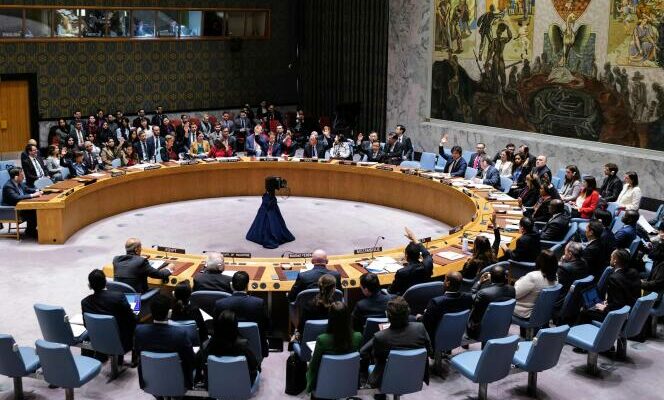After long negotiations, the United Nations (UN) Security Council demanded, Friday, December 22, the delivery ” in large scale “ humanitarian aid to Gaza, without however calling for a ceasefire – a mention that the Americans, allies of Israel, did not want, despite international pressure.
The resolution, adopted by 13 votes in favor, 0 against and 2 abstentions – from the United States and Russia –, “requires all parties to authorize and facilitate the immediate, safe and unhindered delivery of large-scale humanitarian assistance” in Gaza and demands “take urgently” measures both in this regard and for “create the conditions for a lasting cessation of hostilities”. The text also requires the use of “all access and circulation routes available throughout the Gaza Strip” for the delivery of fuel, food and medical equipment throughout the territory.
“We know that it is not a perfect text, we know that only a ceasefire will put an end to the suffering”, commented the ambassador of the United Arab Emirates, Lana Zaki Nusseibeh, at the origin of the initial text proposed on Sunday. But “If we don’t take drastic measures, there will be famine in Gaza”and this text “responds with action to the desperate humanitarian situation of the Palestinian people”she added before the vote.
The resolution is “insufficient and does not respond to the catastrophic situation created by the Zionist war machine”, Hamas responded. The Palestinian Ambassador, Riyad Mansour, greeted him “a step in the right direction”insisting however that it be “accompanied by massive pressure for an immediate ceasefire”.
Israeli offensive blamed
“A humanitarian ceasefire is the only way to begin to address the desperate needs of the people of Gaza and end their nightmare”reacted for his part the Secretary General of the UN, Antonio Guterres, who had “hoped” more from the Council. Directly attacking Israel, he considered that the “real problem” for the delivery of aid to Gaza was the“offensive” Israeli.
The resolution, the result of long discussions under the threat of a new American veto, has largely evolved since the more ambitious version proposed on Sunday by the Emirates. The reference to a “urgent and lasting cessation of hostilities” present in the Sunday text has disappeared, just like the more modest version “urgent suspension of hostilities”. A Russian amendment wanting to return to this call for a “suspension” was blocked by the United States, receiving 10 votes in favor and 4 abstentions. “This is a tragic moment for the Council”declared the Russian ambassador, Vassily Nebenzia, denouncing the ” blackmail “ American.
The Secretary General of Amnesty International, Agnès Callamard, judged ” ashamed “ that the Americans use the threat of a veto to ” weaken “ the resolution. While the inhabitants of the Gaza Strip, shelled by Israeli forces, are now threatened by famine, “the failure to call for a ceasefire (…) is incomprehensible and utterly cruel”denounced Sally Abi Khalil, of the NGO Oxfam.
Several texts rejected
The members of the Council, for their part, wanted to avoid a new veto. These resolutions are binding, which does not prevent certain States concerned from not respecting them.
The World Application
The Morning of the World
Every morning, find our selection of 20 articles not to be missed
Download the app
This is only the second time that the Council has managed to agree on a text. Its previous resolution of November 15 called for “humanitarian breaks”. Five other texts were rejected in two months, including two due to American vetoes, the last on December 8. The United States then blocked, despite unprecedented pressure from UN Secretary General Antonio Guterres, the call for a “humanitarian ceasefire”also considered unacceptable by Israel.
Negotiations regarding this new resolution were also intense around the parameters of a monitoring mechanism to ensure the nature “humanitarian” of the aid delivered, which will ultimately be done under the aegis of a “coordinator” of the UN, but “consultation” with the parties. Israel “will examine, for security reasons, any humanitarian assistance to Gaza”, Israeli Foreign Minister Eli Cohen insisted on Friday. Another sensitive point, the absence once again in the text of a condemnation – and even of the name – of Hamas, castigated by Israel and the United States. The text deplores “all acts of terrorism” as well as “all attacks against civilians”and demands the release “unconditional” of all the hostages.
After the October 7 attack which, according to Israeli authorities, left around 1,140 people dead, mostly civilians, Israel vowed to“annihilate” Hamas, shelling the Palestinian territory, besieging it and carrying out a vast ground operation there since October 27. The Hamas health ministry reported on Friday 20,057 deaths since the start of Israeli bombings, mostly women, children and adolescents, and more than 50,000 injured.
